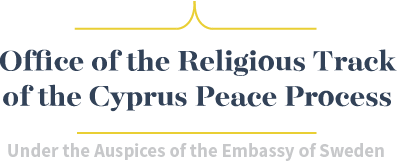Statement from the Office of RTCYPP
Religious Leaders of Cyprus reaffirm that “everyone has a historic responsibility to ensure that the political conflict is resolved and the island is reunited”
In light of the upcoming conference on Cyprus, scheduled to start on June 28, 2017 in Crans Montana, Switzerland, the five religious leaders of Cyprus working together for human rights and peace since 2011 within the framework of the RTCYPP, pray for “a successful outcome that will ensure the end of the unacceptable status quo and entail the respect of human rights and fundamental freedoms as well as each others’ distinct identity and integrity.”
Reiterating their joint statement of 26 February 2014, in support of the joint communiqué of the political leaders of 11 February 2014, the Archbishop of the Church of Cyprus Chrysostomos II, Mufti of Cyprus, Talip Atalay, Archbishops of the Maronite and Armenian Churches, Youssef Souief and Khoren Doghramadjian respectively, and the Reverend Father Jerzy Kraj, head of the Latin Catholic Church of Cyprus and the Apostolic Delegation express their conviction that “a settlement should be based on a bi-communal, bi-zonal federation with political equality, as set out in the relevant UN Security Council Resolutions and the High Level Agreements.”
The religious leaders once again reaffirm that “everyone has a historic responsibility to ensure that the political conflict is resolved and the island is reunited.” They restate their conviction that “there is no alternative to communication, co-operation and co-existence to ensure that Cyprus becomes a haven of peace with justice where religion will no longer be a victim of a political conflict; Where Greeks, Turks, Armenians, Maronites, Latins, Christians, Muslims and people of other faiths will live, work and worship side by side in total freedom and harmony.”
The religious leaders reiterate their commitment to continue to meet regularly, openly express their respect and listen to one another. Their encounters have helped them to get to know each other and understand the other’s needs. Together they have tried to find practical solutions, build trust and confidence and succeeded.
They restate their firm belief that “working together, seeking to overcome differences and supporting each other are obligations for people of faith and tools to promote faith when there is doubt, love where there is hatred and hope to overcome despair.”
